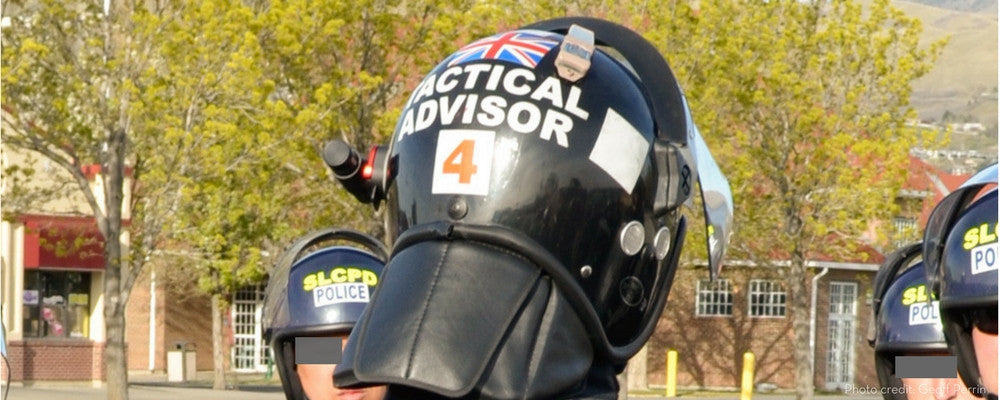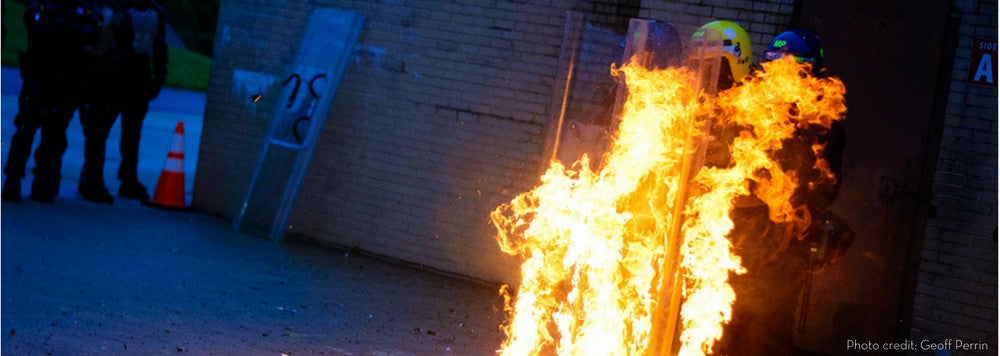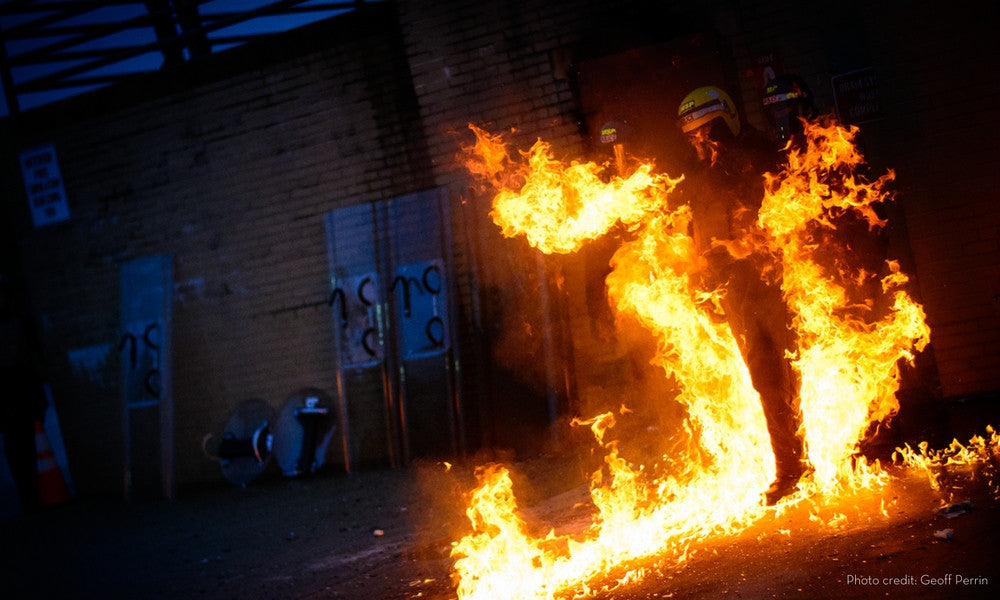
Geoff Perrin - Public Order and Close Quarter Combat Instructor
Share
Geoff, tell us a little about yourself. What are you doing right now?
I am tactical instructor advising for a company and I'm instructing for my own company. We train police and special forces and specialise in public order and close quarter combatives.
How long were you with the Metropolitan Police of London (Met) for and what were you doing prior to joining them?
I was with the Met for ten years and prior to that in British Army for six.

How did you get into training?
I got into training due to a mate, who also acted as a mentor, Kevin Nutter. He thought I would be good at training. “That’s your thing,” he said, so he encouraged me in that direction.
And then how did you end up in your particular specialty?
I did years martial arts prior to joining the military and then in the military I was taught these same skills. In this way it was a natural progression.
Which martial arts?
Taekwondo and Pekiti-Tirsia Kali, which is a Filipino knife fighting martial art.
Can you describe the area of training that you specialise in?
I specialise in public order and close quarter combatives. Close quarter combatives with weapon systems, whether it be firearms or impact weapons. For public order, we have developed a hybrid of what is used in the United Kingdom and what is used in the USA. This is our specialty.
Are you seeing changes in the way the police manage the crowds in civil disorder in the US where you’ve been working?
We are. We’re starting to see a new trend. Instead of relying on chemical ammunitions, and an approach of, “Let’s punish everybody,” we are seeing a more individual approach. In this scenario, individuals are targeted and selected to be arrested and detained, as opposed to, “Let’s just mass arrest everybody.” We’re definitely seeing that change. This is a big change, as they’ve realised that what they’ve been doing for the past 40 years hasn’t worked. The US needed to step outside the box and looked across at Europe to see what they are doing and how and why they changed.

And what’s the big difference between the UK and the US?
The big difference is we just don’t punish everybody. In the UK don’t gas everybody, whether it be by stander who is a 2 year old toddler to a 70 year-old old lady. We treat everybody as an individual and that’s what we do in the UK. I think officers in the UK have a different approach to dealing with people because we don’t rely on a firearm. We generally rely on our ability to communicate but when we do have to use force, we use necessary and reasonable force to proportionately deal with individuals as opposed to large groups.
When you joined the military and the police did you ever imagine you’d be doing what you're doing now?
No. I’ll be honest. What I wanted to do when I joined the police was go into firearms. That’s the direction I was heading, but after seeing a number of mentor officers being I targeted for when they did use lethal force and then how they were dealt with, I decided to focus on public order. Looking back, I think I would have liked to have done more with firearms because I think the UK has one of the best firearms teams in the world, especially compared to what I see overseas in the US. The US standard of training is nothing like what we have in the UK. In the US you do a week of training and you are now a SWAT officer,” as opposed to the Met, it’s a 20 week selection. If you fail any phase, you're out of the firearms program.
Why America?
Why America? I ended up in the US skiing many years ago and doing crossover martial arts training. I think good instructors go and see what else is happening around the world and how it can cross over and be relative. From this I discovered there are so many options in America. More choices, more freedom and more opportunities. After leaving the police and making the choice to stay in America, I just thought I had more options open to me so that’s why ended up staying.
Moving on, how did you discover Armadillo Merino?
Oh, I bumped into – Andy (The Founder of Armadillo Merino®), and I saw he was doing something quite unique. It was a good story, but it’s a story that actually is real. Learning that wool was a hollow fibre up, and then how this could help me. It is like as a good instructor. You learn something new and take it on and think about how it could enhance my ability to do what I do and enhance the guys that I'm training. Armadillo Merino® gives them a better chance of survivability and everything I try to do is back to the end user.
Survivability in the mission that they're facing with all the things happening in America and protests. The suits the officers have might not be the greatest, so wearing Armadillo Merino® gives you that enhanced survivability. It’s like an insurance policy. It just makes you feel a little bit safer and about your capability and what you can do.

It’s interesting. I like the survivability element. I had the next question here as why is base layer so important to you? I think you’ve answered that already, it’s survivability.
I suppose giving me a bit more, especially in Utah, where it gets to 110 degrees during the summer and when I'm in full riot gear it’s bloody hot. Anything that can help me control my core body temperature, that helps me deliver that training. I don’t want to be sweating like a pig and looking like a sack at the end of the day after doing a ten hour training. You want to still stay fresh and still have that comfort as well and know that you're not going to pass out due to heat stress. For me enhances my training which obviously means that the end user gets a better product from me as an instructor, that I'm not going to be, halfway through the day.
It helps me maintain my core body temperature and if it is hot or cold, it flexes to do the different mission it’s tasked for. When I am doing a Molotov demonstration, I'm get 120 Molotovs thrown at me. It just gives me that definite reassurance that I'm not going to burn and I suppose my wife’s happy for that.
What are you favourite Armadillo Merino pieces, if you had to select three?
For me it’s going to be the Long Sleeve Crew (Panther) and the Long Johns Bottoms (Johnnies 2) that go with that. A new favourite for mine is definitely the, is going to be the new Balaclava. In 25 years I think that’s probably one of the best Balaclavas I've ever worn, especially with the hinge on it. You don’t have to stretch it down, dragging your jaw. You can talk to people, lift face cover up and it’s back in place. Yeah, it’s a great piece for me.

Do Americans have trouble understanding you, your accent?
Yes, yes, I'm constantly insulted.
In what way?
Being called an Australian. “So where abouts in Australia are you from?” I am from South-East London, Brixton.
Do they have a nickname for you?
It was “Geoff the Brit” but now they’re calling me the "Brit-Yank". The Brit living in the US!
Are you on Facebook of Social Media?
No, we’re fairly low key. We’re very much a word of mouth. Teams that train with us, know what we do and at the same time it doesn’t publicise or show departments to the public, what they’re up to, what they're doing. It gives those departments a little bit of an edge so that when protests happen, protesters aren’t going out doing intel on police officers tactics. It just gives the police a little bit of an advantage. We like to keep it low profile. My partner however, Jared Wihongi, he is a little higher profile, being a New Zealander and much better looking in front of the camera.
How can we learn more about what you're doing?
We have a website. www.survivaledgetactical.com



